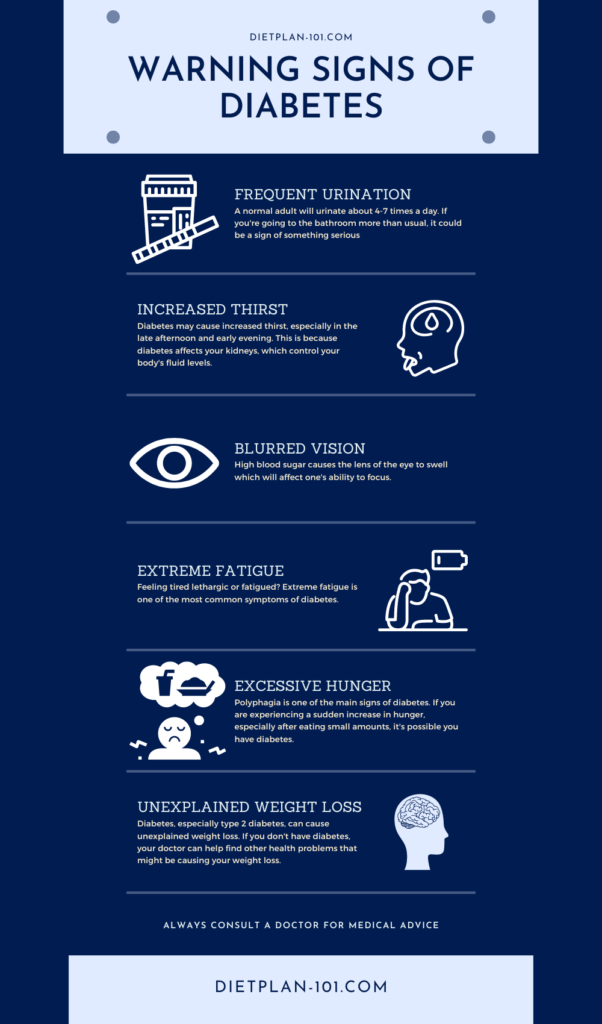
This is a general guide on some warning signs of diabetes. Always consult a doctor for any medical inquiries. Check out our diabetic diet recipes for some ideas for diabetic patients. If you want to learn more about the diabetic diet, click the link. A diabetic diet consists of many food groups based on the diabetic food pyramid.
[ads]
What is Diabetes
Diabetes is a condition where your body does not properly use glucose, a kind of sugar in your blood. With this condition, the body cannot keep up with the amount of glucose in the blood, so it starts to store unused glucose as fat. Over time, if this insulin resistance continues unchecked, it can lead to serious health problems
Insulin is a hormone that lets your body use sugar from carbohydrates and starches, which come from food. Diabetes is a disease in which the body does not produce or use insulin normally.
Diabetes can cause serious health problems if your body does not get the nutrition it needs. it can affect any organ in your body and may lead to stroke, kidney failure, blindness, and infections of the heart or other organs
[ads]
Types of Diabetes
Diabetes is a common disease with two types of diabetes: type 1 and type 2.
Type 1 diabetes usually develops in children or young adults. It occurs when the pancreas does not make enough insulin or cannot store any insulin produced by the pancreas. People with type 1 diabetes must take insulin injections to stay alive.
Type 2 diabetes can occur at any age, but it often appears after age 60 and generally seems to run in families. This form of diabetes develops when your body stops responding properly to insulin, causing excess glucose in the blood
Warning Signs of Diabetes
Here are some common warning signs of diabetes. (Note: Always consult a doctor for medical advice)

[ads]
Frequent urination especially at night
A normal adult will urinate about 4-7 times a day. If you’re going to the bathroom more than usual, it could be a sign of something serious. But there are a few common conditions that can lead to frequent urination. Diabetes, for example, can cause you to feel like you have to pee all the time. If you’re worried about diabetes, see your doctor. If a family member has had diabetes, you may be at higher risk for developing it too.
Increased thirst
Diabetes may cause increased thirst, especially in the late afternoon and early evening. This is because diabetes affects your kidneys, which control your body’s fluid levels. So when you have diabetes, your kidneys can’t remove the extra fluid that otherwise would be excreted. As a result, you might have to urinate more frequently and feel thirstier than usual.
Blurred vision
High blood sugar causes the lens of the eye to swell which will affect one’s ability to focus. People with blurred vision should see an optometrist or ophthalmologist who can check the back of their eyes with a retinal camera, measure their blood sugar, and determine if they have diabetic retinopathy.
Extreme fatigue
Feeling tired lethargic or fatigued? Extreme fatigue is one of the most common symptoms of diabetes. So if you’ve been feeling unusually tired for some time and you have other symptoms such as frequent urination or blurred vision, it could be time to talk to your doctor about a possible diagnosis.
Excessive Hunger
Polyphagia is one of the main signs of diabetes. If you are experiencing a sudden increase in hunger, especially after eating small amounts, it’s possible you have diabetes.
Unexplained weight loss
One of the most important things to do when you lose a lot of weight suddenly is to see your doctor and find out what’s causing it. Diabetes, especially type 2 diabetes, can cause unexplained weight loss. If you don’t have diabetes, your doctor can help find other health problems that might be causing your weight loss.




